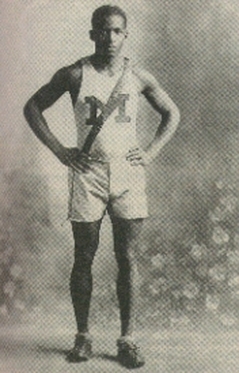William DeHart Hubbard’s Leap Toward Gold
At the University of Michigan, Hubbard began running track, dominating events such as the 100m dash and the long jump. Right before being recruited to the USA Olympic team, Hubbard helped the University of Michigan win the 1924 Big Ten championships in the 100m dash, running a time of 9.8 secs, and jumping an incredible 24 ft 10¾ in in the long jump, beating Edward Gourdin, who was the world record holder at the time. The feat established Hubbard as one of the best jumpers in the world. In Paris later that year, Hubbard showed the same skill, jumping 24 ft 5 ½ in to win the Olympic Gold Medal in the long jump, making him the first black individual gold medalist. Hubbard encouraged integration in track & field sports. Today the world record for the long jump is set a 29 ft 4 ¼ in in 1991 by Mike Powell, a black American born and raised Philadelphia.
Although Hubbard’s track career only lasted until he graduated college, he continued making strides, jumping a marvelous 25 ft 10 ⅜ in his senior year and tying the world record for the 100m dash at 9.6 seconds. After graduating with honors in 1927, Hubbard worked for the Department of Colored Work for the Cincinnati Public Recreation Commission, before moving on to work for a public housing project and later the Federal Housing Authority, helping impoverished people gain access to housing. But even though Hubbard chose to focus on social work, the competitive spirit in him continued through his participation bowling. In the 1950s, Hubbard served as the President of the National Negro Bowling Association, later renamed the National Bowling Association (NBA) to encourage integrating African-Americans into bowling. Additionally, he founded a professional baseball team, the Cincinnati Tigers, which played in the Negro American League.
Arthur Ashe mentions Hubbard in a Hard Road to Glory, his history of African-Americans in sports, stating that “William DeHart Hubbard, the NBA president in the 1950s and the first black gold medalist in the long jump in the 1924 Olympic Games, said the NBA provided a point of entry into the ABC for blacks,” a testament to just how vigorously Hubbard worked to integrate sports.
Hubbard was inducted into the National Track Hall of Fame shortly after his death in 1957 and remains in the University of Michigan’s Hall of Honor, which recognizes people who made significant contributions to athletics, enhancing the reputation of the University. In Hubbard’s honor, the William DeHart Hubbard Scholarship Fund now exists to help students of color attend the University of Michigan.

